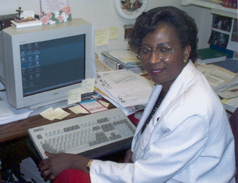One woman’s journey into nursing education began with an opportunity she purposely missed.
Rosaline Olade, Ph.D., skipped her high school graduation to avoid a prearranged career in teaching. 
Valedictorian of her class, Dr. Olade had been chosen to receive a scholarship during graduation to study mathematics or science so she could return as a high school teacher. At the time, secretaries, teachers and nurses were the only professional jobs open to women in Nigeria. But, Dr. Olade’s dream was to become a nurse.
“But as God would have it, here I am teaching,” said Dr. Olade, an associate professor in the UNMC College of Nursing, department of gerontological, psychosocial & community health nursing. She also is coordinator of undergraduate gerontological nursing for the Omaha campus.
Before joining UNMC in August 2001, Dr. Olade was an associate professor at the University of Texas in Tyler and an adjunct associate professor at Texas Tech University in Lubbock.
Aging: a childhood interest
Dr. Olade’s interest in gerontology, the branch of science dealing with health issues in aging, started during her childhood.
“I really love the elderly,” Dr. Olade said. “I grew up in an extended family, where my grandmother and my grandfather were always there. They were really close to me and I was attracted to understanding the elderly and wanting to work with them.”
Dr. Olade’s travels to different countries have given her insight on different cultural attitudes toward the elderly and aging. “In the African culture, you are more attached to your family,” she said. “We have a lot of respect for the elderly, for their experience and their wisdom. That is not really the case in America. My intention is to teach my students to respect the elderly for who they are. This awareness will make them better health-care providers.”
Educational journey
Dr. Olade earned her registered nurse diploma at University College Hospital in Ibadan, Nigeria, in 1970. She earned her bachelor of science in nursing in 1974 from the University of British Columbia in Vancouver, Canada, followed by a master’s of science in nursing in Community Health from the University of Toronto in 1980. In 1986, Dr. Olade earned her Ph.D. in educational evaluation from the University of Ibadan in Ibadan, Nigeria.
She did postdoctoral work at the University of Pennsylvania in Philadelphia from 1988-1989. Her postdoctoral study on cultural sensitivity of the Denver Developmental Screening Test, a health assessment tool for children, contributed to modifying the tool to the new Denver II Screening Tool, which is currently used for screening children internationally.
Dr. Olade has served as a curriculum consultant for many nursing schools in Nigeria. In addition, she served as a research consultant to Trinity Mother Francis Hospital in Tyler, Texas before moving to Nebraska. She also has served as her country representative to the World Health Organization Assembly.
An international perspective
Dr. Olade’s international nursing experiences have exposed her to differences in health-care systems around the world. She worked as a staff nurse in Ibadan, Nigeria, from 1970-1971 and at Vancouver General Hospital from 1972-1974. She also served as medical programs review specialist in the Arizona State Health Care System in Phoenix.
Dr. Olade brings her extensive knowledge of health care to the classroom.
“A student told me that I have a broader international perspective,” Dr. Olade said.
In addition to teaching nursing, Dr. Olade encourages students to travel to broaden their education and life perspectives. “People who have traveled widely can easily adjust and interact with people of other cultures. When Americans travel outside of the country, they will realize that they, too, have an accent, especially if they are from Texas.”
Her students’ appreciation for her teaching is exemplified in nominations for the University of Texas System Chancellor Award for Excellence in Teaching in the 1999-2000 and 2000-2001 academic years.
Treating the total patient
During her career in nursing and education, Dr. Olade has seen many technological advances and improvements in the diagnosis and treatment of patients. Yet along with all the changes in nursing, she continues to instill in students the most fundamental element of treating patients.
“The patient is the most important person in the hospital,” Dr. Olade said. “The psychological care of the patient is important, as is the emotional care. We teach students to really look at the total patient.”